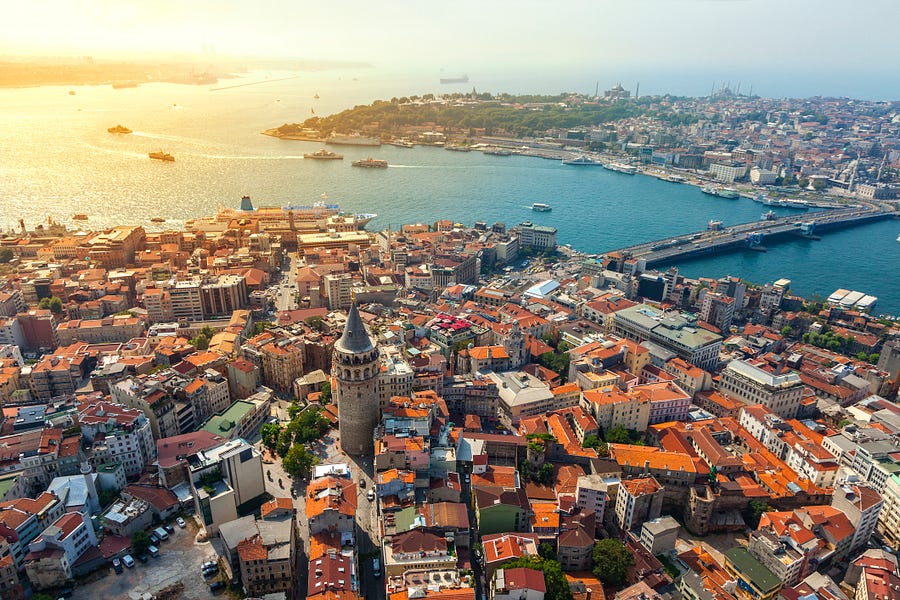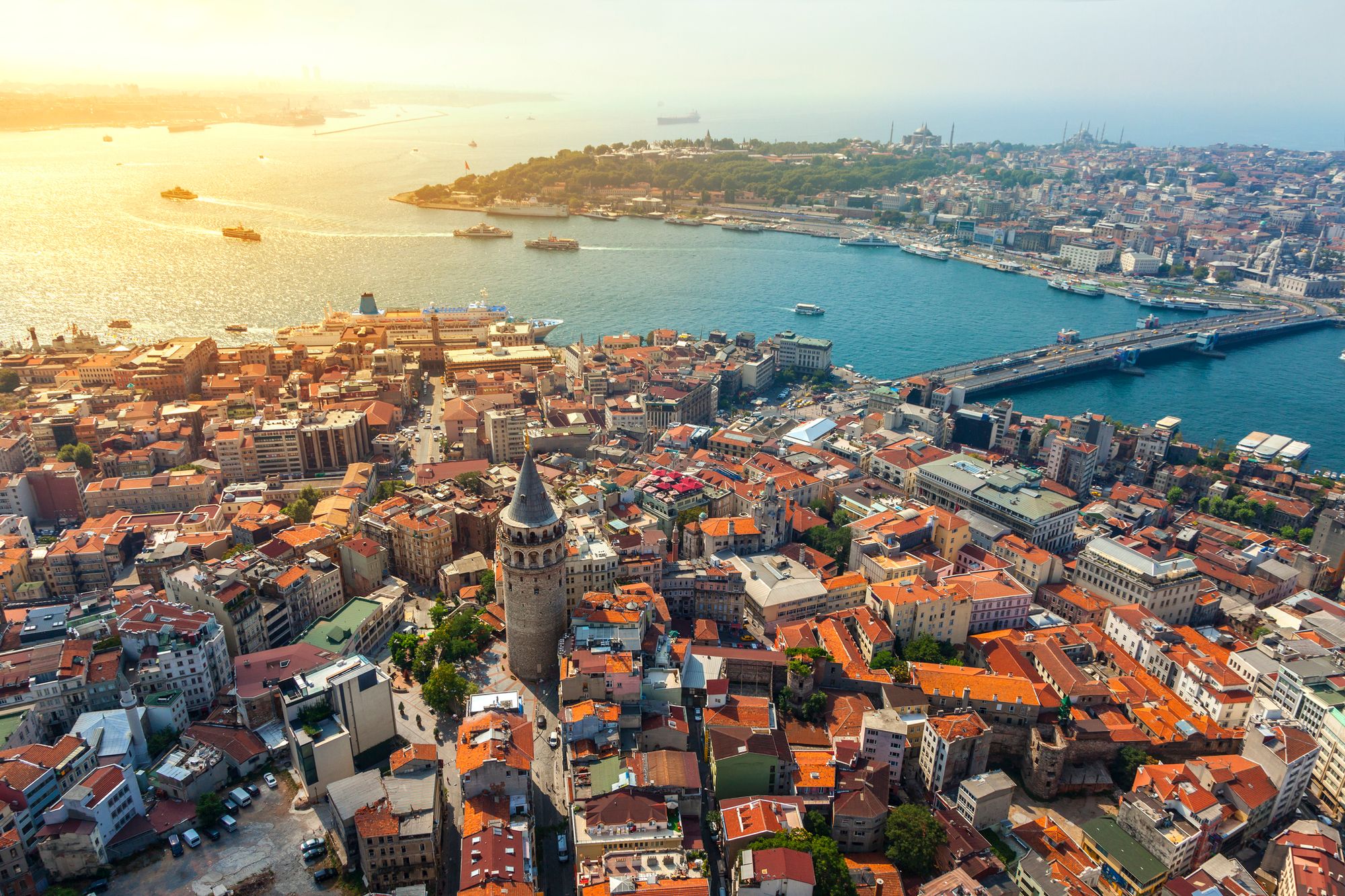Life After Being The Center of The World
The hüzün of Istanbul, rendered by Orhan Pamuk, has some lessons for an America that sees itself as the axis on which the earth rotates.



Edited by Sam Thielman
IN FEBRUARY 1972, a young, wealthy İstanbullu was at an impasse over what to do with his life. His passion for painting had vanished along with a first love whose portrait he used to paint. His mother, fearful for his prospects as an artist, pleaded with him to get an architecture degree. To clear his mind, he boarded a ferry and crossed the Golden Horn, the better to connect with his 1,600-year-old city.
Thirty years later, he remembered that crossing:
Through the ship's trembling windows I could see the ruined old wooden houses; the old Greek neighborhood of Fener, still half abandoned due to relentless state oppression; and among these ruined buildings, looking more mysterious than ever under the dark clouds—Topkapi Palace, Suleymaniye Mosque, and the silhouette of Istanbul's hills, mosques and churches. Here amid the old stones and the wooden houses, history made peace with its ruins; ruins nourished life and gave new life to history.
That young painter became Orhan Pamuk, contemporary Turkiye's most celebrated novelist. (I'm not remotely familiar enough with the Turkish literary scene to say he's the greatest, but he deserves the celebration.) His recollection appears in his 2004 book Istanbul: Memories And The City.
As a New Yorker, I can't stop thinking about Pamuk's line about the regenerative power of a city's history. For hundreds of not-always-consecutive years, across two empires, Istanbul was something like the center of the world. Pamuk, a native, grew up long after the various golden ages of Istanbul had passed, but not long enough to have eroded the memory of what the city had been. As Americans in an era when America's global supremacy is fading, it's worth considering what our Istanbullu future holds.
PAMUK, AND I GATHER NOT ONLY HE, calls it hüzün. Hüzün is a kind of "social melancholy," he writes; a collective wistfulness about lost greatness. While I won't pretend to understand the concept after reading a grand total of one book about it, Pamuk's description of hüzün seems not to carry seeds of revanchism. American revanchism, with MAGA the most significant case study, sees no difference between the loss of supremacy and the death of the society, and will license violence to be Great Again. Hüzün is past all that. Hüzün recognizes that the apex of greatness will not return. The sadness it brings on, however, is mixed up with the recognition that life has to go on. Hüzün isn't something anyone wants to have – certainly not Pamuk – but it's something we are left to endure, navigate and accept. The communal aspect of it can make endurance, navigation and acceptance easier.
The only other work of Pamuk's I've read is My Name Is Red, a truly great and surely enduring novel. I feel now that I better understand what Pamuk was doing by setting his novel in 16th-century Istanbul, the pinnacle of Ottoman power. He was showing us a vision of Ottoman greatness lost under the pressures of the Republic of Turkiye's Ottoman erasure, Republican Westernization and Western disinterest in the Ottoman legacy. To the West, Ottoman history begins with decline, since the Western political imagination begins with the rise of modernity in the 18th century, a period well past the Ottoman heyday (even if the empire had yet to enter terminal decline); and because Christian Europe has a difficult time acknowledging the achievements of Islam in Europe.
Pamuk wants to show the opposite. Ottoman Istanbul in the 16th century was perhaps the most cosmopolitan place on earth. Like great cities before and since, its civilizational splendor lived cheek-by-jowl with its derangement. I'm a New Yorker, so that's something I recognize.
My Name Is Red's bard of the Ottoman Istanbul streets is a Jewish woman named Esther. That choice reflects Pamuk's hüzün. The Jewish community of Istanbul is a pale reflection of what it was, thanks to, among other factors, the 1955 pogrom against Greeks, Jews and Armenians.
This is what has become of the place where (alongside Salonika) the Jews, exiled from Spain in 1492, were welcomed by Sultan Beyazid II, who is said to have remarked about King Ferdinand: "If a ruler enriches my country while he is making his country poor, how can he be a wise ruler?" The Ottoman Sultans gave community representation to the Jews on the divan, something simply unique in European history. Pamuk, a sentimental writer, is admirably frank in My Name Is Red about antisemitic violence in Istanbul. But with perhaps the exception of the Emirate of Cordoba, the best place to be a Jew in all of European history, far and away, was the Ottoman Empire. Esther is often chastised, even despised, for her Jewishness. But like the Lox, she is the streets.
There's no need to glorify or sanitize the Ottoman Empire. Like all empires, it was built on blood and exploitation. Its terminal phase of decline, in the 20th century, was horrific, as it committed genocide against the Armenian people.
Pamuk isn't nostalgic for any of this. The Ottoman legacy, to him, is what Westerners tend not to emphasize, and what the Turkish nationalists who commandeer and then replace the empire in the 20th century betray: hundreds of years of cosmopolitan social harmony between a dizzying number of communities. Istanbul instantiates that legacy. When Pamuk observes the emptiness of Fener during his 1972 voyage on the Golden Horn, what he dreads to see is how quickly cosmopolitanism, even within its seat of power, yields to sectarian bloodlust. My New York lifetime includes Howard Beach, the Crown Heights riots, the framing of the so-called Central Park 5, the post-9/11 repression and the Ground Zero Mosque hysteria, so I'm not inclined to disagree. Donald Trump is a native New Yorker too.
But when Pamuk sees the skyline of Istanbul – truly one of the world's greatest skylines, a city crowned with jewels like the Topkapi Palace, the Hagia Sofia, the Suleymaniye Mosque, the Blue Mosque – 1,600 years and multiple great civilizations, atop and beside one another, look back. Istanbul survives, majestically, long after it had ruled. Only İstanbullus can decide which of its traditions will define the city for the remainder of its time on earth. Can hüzün motivate regeneration? Ruins nourished life and gave new life to history.
WHAT DOES any of this have to do with America?
Whatever multipolar order is emerging in the early 21st century, it doesn't spell the end of American global power. At some point, and the estimates keep shifting, China's economy will overtake America's. But then the U.S. will have… the second largest economy in the world. For at least another generation, and likely longer, thanks to renewed imperial contestation Great Power Competition, American military power will dwarf its competition. America's position atop the global arms trade is commanding: it accounts for 39 percent of worldwide arms sales; its next competitor, Russia, accounts for 19 percent. A cornerstone of U.S. military strategy is forward deployment, and its global network of alliances and partnerships—while certain to become contested, now that there's another patron—is far more robust than any competitor's. All this is to say that there's an enormous difference between losing unchallenged supremacy and becoming globally irrelevant.
But that clashes with the civic religion of American Exceptionalism, which operates along Ricky Bobby's flattening "if you're not first you're last" binary logic. American elites' experience of The End of American Global Leadership does not need to have a robust material basis to have demagogic, volatile consequences. Trump's China hysteria, now ratified by Biden's, testifies to this. There are lots of ways to greet the end of unipolarity besides a Cold War. But a Cold War suits both American elites' material interests and foundational exceptionalist narratives about what it is to be American—and foreign policy is a highly undemocratic aspect of American policymaking, resisting a democratic counterweight—so here we are, deferring a reckoning with what it will mean to be American after supremacy.
It's going to be a very long time before Americans experience anything like hüzün. A mass extinction may very well precede it! On his trek through Istanbul's history—always alongside its present—Pamuk conceives of different ways to live after the end of civilizational dominance; to honor the achievements of a great civilization; to acknowledge the atrocities that went with it; and to resist the temptations to vent the frustrations of lost dominance upon the most visible and vulnerable. (Not something the Turks—or Americans—have a great track record of!) Istanbul is far ahead of New York in this historical journey. If Pamuk's vision for Istanbul triumphs, and if New York triumphs, it will be through forging a future based on a recognition that together, in the vibrancy of the enduring city, we have what we need—if only we will only meet the needs of those we have.

